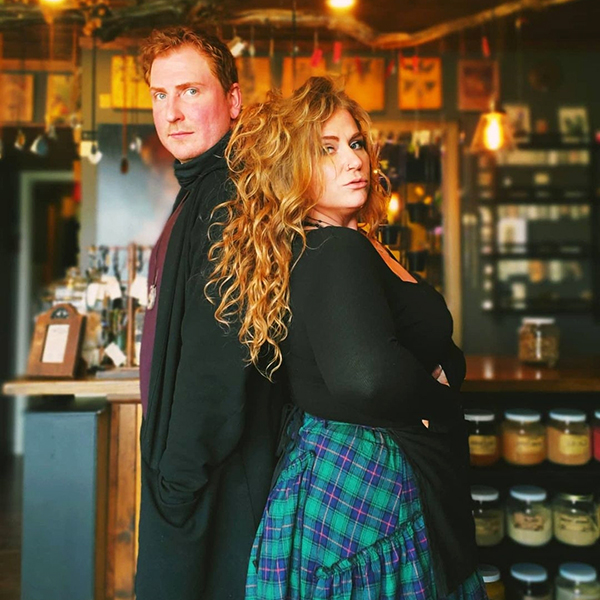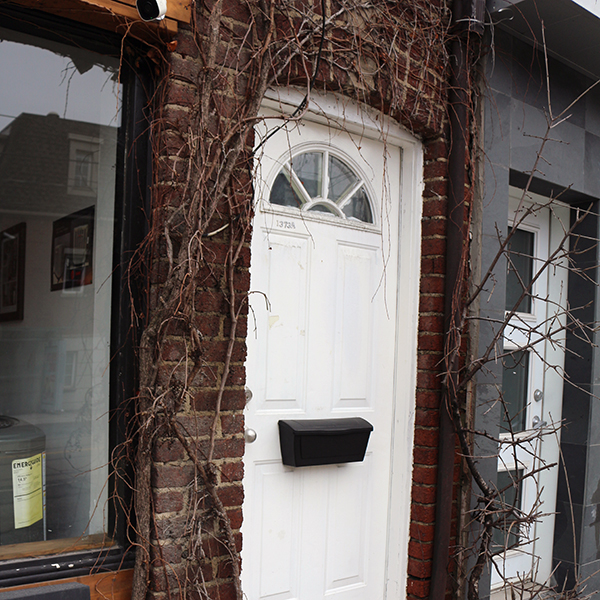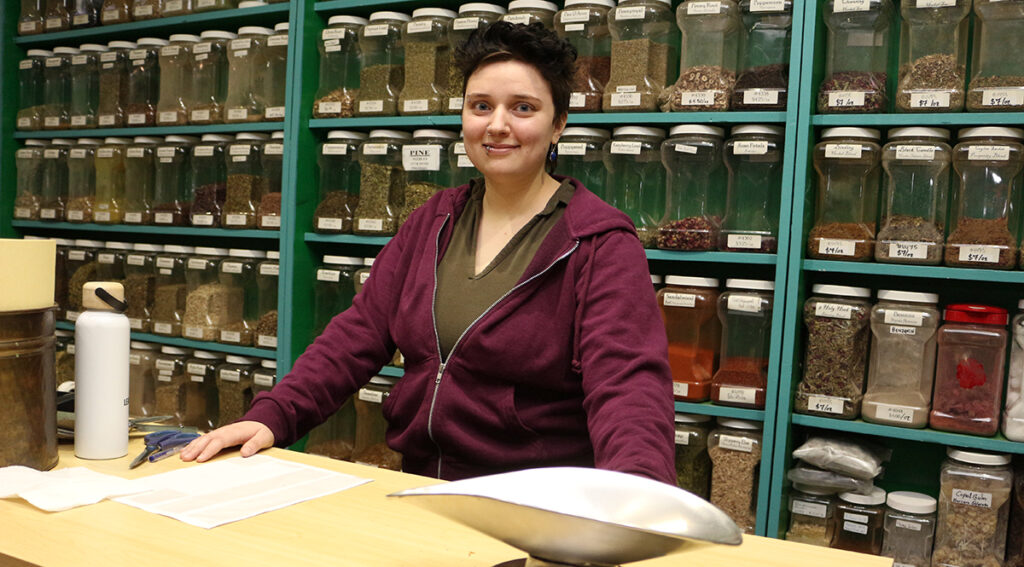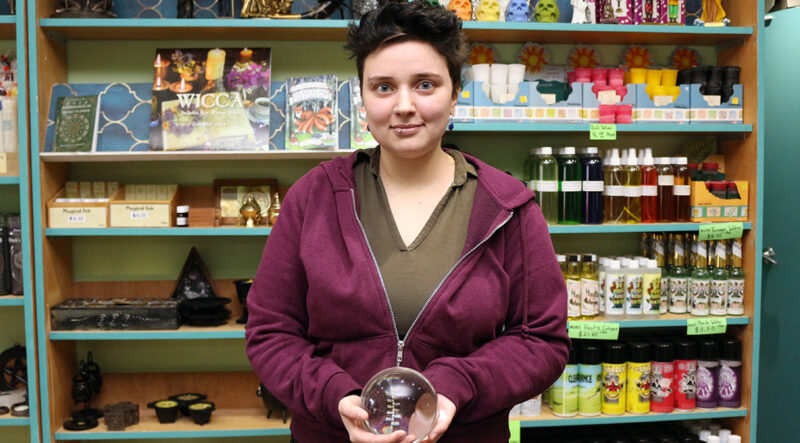Not everyone welcomes occult bookstores with open arms in Canada.
There is still a surprising amount of stigma associated with those who sell wares relating to the metaphysical.
“Satanic panic was in the ‘80s and it’s still a mindset that a lot of people have,” Lex Veld-Martul says, seated in a chair in the basement of the Occult Shop in Toronto. “Thankfully it’s less and less an issue that we have to deal with, and that’s partially due to more acceptance in the mainstream consciousness.”
They recount one time when a visitor to the store’s previous location next door ripped the ivy — cultivated for years by the founding owners Richard and Tamarra James — from the brick façade.
“It had been growing there for years, and this woman came in, started yelling at us about how we were all Satan worshippers and we were going to hell and all this nasty stuff,” Veld-Martul recalled, during a March 2024 interview. “She went out the door and grabbed the vines and ripped them down and killed them.”
There’s a shroud of sadness that falls over Veld-Martul as they recount that day, but they transition smoothly into the roots of The Occult Shop being tied deeply to the origins of the Wiccan Church of Canada.
Richard and Tamarra James founded the church in 1979, and the store’s origins coincide with that timeline, having existed on Bathurst, south of St. Clair Avenue, and west of the landmark Casa Loma for over 40 years. The Occult Shop was one of the first of its kind in Canada.
“(The James’) goal was to grow Wicca, and paganism in general, into something people would know more about,” Veld-Martul said. “Over the years, a community started to form of the people who were coming here and Richard and Tamarra noticed they weren’t only serving Wiccans, but they were serving people from a wide variety of practices and cultures.”
As the store’s clientele grew, the James realized that it was diversifying, so they began to educate themselves about the various beliefs of their customers, including the Afro-Caribbean religion Santeria and other African diaspora religions such as Ifá.
With other niche spiritual practices being practiced, opportunities abound in other centres across the country. Although Veld-Martul admitted they weren’t aware of any occult or metaphysical shops outside of Toronto. The opportunity to connect with and create an organization that works with occult shops is there, but the key challenge is to educate and de-stigmatize paganism and Wicca.
There has been an ongoing drive to have the Wiccan Church recognized by the federal government as an official religion. On June 6, 2017, the passing of Bill C-51 amended the Canadian Criminal Code and the Department of Justice Act, repealing the law that made pretending to practise witchcraft a crime.
Empowerment for women
Travel to the Prairies and you will find Marie and Thomas Webster proprietors of Nocturnus Art and Metaphysical.

Thomas, left, and his sister Marie Webster started
Nocturnus Art and Metaphysical in 2019.
Located on Isabella Street in Saskatoon, the brother and sister duo started the shop in 2019, filling the void left by the loss of The Witch’s Brew.
Opening a metaphysical was something Thomas had wanted to do since he was a kid, admitting so much during a March phone conversation. Although it might have been something outside the norm when Webster was a child, he has noticed an uptick in awareness as an adult.
“Over the past couple of years, there’s been a huge, swift gaining popularity in the culture and the subject,” he said.
Still, there is stigma, especially across a province that is predominantly known for farming, mining and salt of the Earth types. But it’s not from the mainstream Christian or Roman Catholic sects. Most of the ire directed at the store comes from evangelicals.
“Surprisingly, there are so many different businesses now, here on the Prairies, that we’re not the only ones here in Saskatchewan,” he said. “We kind of tone it down a little bit to make it digestible. Otherwise, once you reach a certain point, you don’t want to scare your customers away.”
They will carry books about the Hermetic Order of the Golden Dawn and Aleister Crowley and you will also find grimoires dating back to the 1500s, but they are accessible in a back room.
“A lot of times when people are drawn to it, they love the idea or the concept of being a witch or having an enchanted life,” Webster said. “Once they start to understand that there’s more to it, once they put not just a toe in the water, but a leg, then they start to realize it’s for them.”
One misconception that people have when someone is drawn to witchcraft or paganism, it’s often shrugged off as a phase, or being trendy. Words like “energy” are bandied about, which Webster admits is in vogue.
“People just kind of view it as, if I could do quote marks here, energy healing because it’s such a broad spectrum,” he said. “I find a lot of newcomers or people that don’t understand it, hear these words and then they might de-validate the training or the knowledge of actual practitioners.”
Not to knock the trends, as pop culture creates a comfort zone for paganism that avoids further demonization, but still gets stigmatized as woo-woo hippy chic.
One thing that brings customers to the store is encounters with the paranormal. Some do not know who to turn to and are reluctant to call attention to their experiences or be criticized, so they turn to a metaphysical shop to understand how to smudge — the act of burning sage to cleanse a house or location.
The clientele for the shop is 90 percent female, and a key contributor to that is the prevailing trend of feminism within North American culture.
“For women specifically, a lot of it is a sense of empowerment, of being able to help yourself heal … it’s under this guise of spiritual guidance, but what it is, is self-guidance and self-governance,” Marie Webster said, during an interview on International Women’s Day. “We see this in history where people take words, for example, the term witch, and when it was once to demonize and segregate women; a lot of the destruction of femininity and womanhood, being coined as this evil seductress.
“There’s a lot of this terminology that’s wrapped up in that, where now it’s a reclamation of the word itself and it comes from a place of power.”
The healing power of mountains
On the West Coast, Phoenix Rising Metaphysical Emporium & Wellness Centre in Langley, British Columbia is a safe bet for Wicca and occult practices. Goldie Lundbek is the owner and remembers many esoteric stores that provided wares to the curious.
However, there are more challenges facing metaphysical stores in the Lower Mainland, including the expenses accrued when selling wares that take a little longer to be handmade.
“It’s interesting because people say they want stores like this and they want to support them, but then the things we supply aren’t mass produced and cost more money than something you find online and so they’ll see it and they’ll say, ‘It’s just a candle,’ but then they don’t realize it’s a candle that took a person eight hours to make.”
Lundbek is the coordinator and lead for Vancouver Pagan Awareness Day, which takes place this year on August 10. Safety for the pagan community also coincides with safety for the LGBTQ+ community for Lundbek. Phoenix Rising is a positive space in Langley.
“We are one of the safe places for Queer folk in our town, whether or not they’re pagan,” she said. “Openness and just acceptance, and that’s not just in our community — our community is wonderful — but the world needs more of that.”
Friendly neighbourhood metaphysics
Power, and comfort all make for a stronger community. Pamela McInnis is the owner of the Neighbourhood Witch General Store in Halifax, Nova Scotia.

The ivy outside The Occult Shop’s original location
was torn down by an unruly visitor, killing the
plant.
There aren’t many barriers for her on the East Coast, as the store is treated with respect by the community, however, The Neighbourhood Witch does get mistaken for a Halloween shop now and again. Still, Paranormal investigators do drop in from time to time to ask questions about hauntings.
“Out here, we’re pretty liberal when it comes to spirituality,” she said. “There isn’t a lot of pushback for us out here, but I know that’s not the case in other parts of the country. We rarely have anybody come in with something to say about it.”
The Neighbourhood Witch has been around for eight years. It filled the hole left vacant by a previous metaphysical shop that was open for 25 years, of which McGinnis had worked as a teenager. McInnis refers to her shop as grey, as they feature wares for all spectrums from dark to light; Baphomet statues mingle with the healing herbs.
Baphomet, the symbol of the equilibrium of opposites, has often been maligned by modern Christian beliefs because of its goat head and pentagrams.
Still, the stigma has quelled since McInnis first worked at an occult shop in the 1990s.
“It was under the guise of being a bookstore; it had mostly books and then some pagan-related,” she admitted. “There’s been a lot of coming out of the broom closet as the stigma has lessened quite a bit since the ‘90s.
“People are getting more open-minded and for some reason, after COVID, everyone has been going on an inward journey.”
And that sense of self-discovery has lent itself to community-building, especially when it comes to sourcing local goods.
“I think it depends on the store because we have a good amount of products made locally,” McInnis admitted. “If you carry locally made things, that’s where it gets more interesting … there are certain things that every witch store is going to carry.”
The locally sourced product allows for artisans within the community to share their wares. And that makes The Neighbourhood Witch a congregational point for the community.
“It’s certainly a hub because witches don’t have churches. We have witch stores and the outdoors,” she said, with a laugh. “I think that’s pretty common for a lot of shops like this.”
Hedging stigma
Travel north of Toronto to East Gwillimbury, and you’ll meet Diane King, proprietor of The Hedge Witch. She’s just a stone’s throw away from the Sharon Temple National Historic Site and Museum, and located in the original building for the community’s post office and general store.
That means the walls that house the metaphysical shop are about 180 years old. But for Diane King, the work to dispel the stigma associated with occult bookstores in Canada has been ongoing for 24 years.
“It’s not as bad as it used to be, but at the beginning, we had petitions to get us closed down, people wouldn’t let their children come anywhere near the shop, people would cross the road instead of walking in front (of the store),” King recalled, during a March phone conversation. “We had a drive-by holy watering; a church group came and prayed in front of the shop several times. And the local Catholic schools warned the kids to stay away, so of course it made them all the more curious.”
Even though the negative vibes have mostly gone away, there is still the challenge of misinformation coming through social media; chiefly TikTok. Still, the variety of people coming into The Hedge Witch runs the gamut from Buddhist monks to druids.
The one misconception King admitted, was that people often get witches and Wicca mixed up.
“Wiccan can call themselves witches, but not all witches are Wiccan,” she said. “Wicca is a structured religion with hierarchies and everything. Witchcraft is a way of life.”
Many folks enter the store to get help with alleged hauntings in their homes. Paranormal investigator Glenn Laycock of Canadian Paranormal Investigations visited the shop with questions about his home, while medium Angel Morgan showed up right from the store’s inception.
Admittedly, when it comes to ghosts, King noted that there are only four reasons for a revenant to remain on this plane: “They don’t know they’re dead; they’ve got unfinished business; they’re afraid of going to hell or someone or something is holding them here.”
King said she advises customers, but The Hedge Witch staff haven’t done house clearings for quite some time.

Lex Veld-Martul has noticed a boom in young Ontarians visiting The Occult Shop in Toronto.
The future of witchcraft
Further to King’s thoughts about social media sites like TikTok, the digital world has been a great source for discovering new practices, but also the greatest source of misinformation.
All the proprietors of such shops agree that even though ignorance and fear from people of other faiths have abated, the new challenge is educating customers properly.
“If you go on TikTok or other social media, (Wicca) has gotten a huge surge of young people interested in these kinds of practices,” Veld-Martul said. “And I think that’s awesome. We see more and more in the store —young kids who are not being dragged in by their parents, who are independently developing an interest in crystals, tarot, herbs, whatever it might be.”
That’s a sign of optimism within Veld-Martul, who adds that their families support the same young adults as they discover new belief systems.
“It’s very healing to a lot of the older members of our community because so many people have faced a lot of issues with acceptance from their families and society at large,” they added, admitting that with the surge of mainstream attention, bookstores like Indigo have started to carry things on the occult. “I’m not knocking it. That’s what (businesses) have got to do, but it does make it a little bit harder for places like ours who have been sitting in this little niche for such a long time.”

